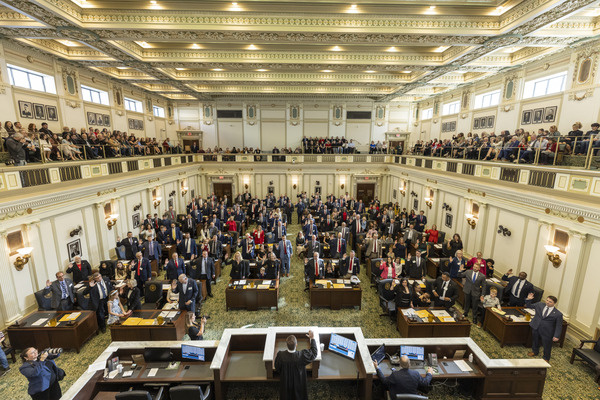Judicial Reform: Oklahomas Missed Opportunity
Known as Senate Joint Resolution 34, it also passed the Oklahoma House Rules Committee by a 6-3 vote. Full House approval appeared likely, after which both bodies would work out their differences in plenty of time before the people of Oklahoma would vote on it this November. If voters approved the measure, the Oklahoma Constitution would have been amended in a way that would have positive, far-reaching consequences.
Unfortunately, that’s not going to happen. SJR 34 failed in the House of Representatives by a vote of 36-60. A whopping 40 Republicans joined 20 members of the House Democratic Caucus in voting it down. Five members were excused from the vote.
Why is this so important and in effect, so disappointing? It’s because of the flawed way Oklahoma currently chooses members for the Court of Civil Appeals, Court of Criminal Appeals and the Oklahoma Supreme Court. When a vacancy occurs under the current system, a 15-member Judicial Nominating Commission (JNC) secretly selects up to three nominees for court positions. The governor is then required to select one of these candidates and cannot consider any other qualified individuals.
The JNC does not hold public meetings, nor do they interview candidates in pubic. They’re not subject to Oklahoma’s Open Records Act or its Open Meeting Laws. Plus the JNC doesn’t reveal how members vote on judicial nominees.
“The JNC is one of the most opaque processes in the state,” said Senate President Pro Tempore Greg Treat (R-Oklahoma City). “They’re not subject to open records. We have no idea what questions are asked or if they are meritorious questions.”
Research conducted in 2019 by the 1889 Institute, a conservative think tank found that Oklahoma’s JNC is among the most secretive in the nation. Most other states with similar systems have open meetings and public votes on their nominees.
This system also is at odds with the model for appointing judges that’s established in the U.S. Constitution. Under that model, the governor would nominate judges and legislative approval would be required for confirmation.
“It’s a tried and true system,” says Senator Julie Daniels (R-Bartlesville), who introduced the legislation. “It goes back 235 years and was created by our founding fathers as the best way to appoint the appellate judiciary and achieve that separation of powers.” Others add that it’s also more democratic, as it puts judicial selection into the hands of elected officials who are accountable to the voters.
The JNC consists of six members who are selected by the Oklahoma Bar Association (OBA) through its internal membership selection. No other attorneys are allowed to serve. Six members are appointed by the governor, one member by the Senate President Pro Tempore, one by the Speaker of the State House and the 15th member by the other 14.
While the OBA can appoint any six attorneys they approve, the governor’s hands are tied. No more than three of the six he or she chooses can come from the same political party. While most members serve six years, members appointed by the legislature can only serve two years, are barred from serving consecutive terms and cannot be married to or related to an attorney.
“It’s a very restrictive appointment,” says Treat.
While proponents of our current system claim it’s non-partisan, history shows that’s not the case. Twenty-two of the 32 JNC members selected by the OBA from the year 2000 to today (69 percent) have directed most of their campaign donations to Democrats, including Barack Obama, Hillary Clinton and both of Governor Kevin Stitt’s Democratic gubernatorial opponents. Most Oklahomans are unaware of the bar’s strong Democratic leanings, or its role in selecting judges to the Oklahoma Supreme Court.
The Democratic-dominated JNC almost always selects liberal Democrats for Oklahoma judgeships. A Republican governor is left no choice but to choose someone at odds with his philosophy or the values of most Oklahomans.
Carrie Severino, president of the Judicial Crisis Network, has said judicial appointments systems like Oklahoma’s are “how you might get a red or purple state with a blue judiciary.”
Research conducted by University of Auburn and University of Georgia professors from 1970 to 2019 have proven the strong liberal slant of Oklahoma judges throughout the entire 49-year period reviewed, only dipping slightly in recent years. Few states, even blue ones such as New York, California and Massachusetts, had liberal ideology scores consistently higher than Oklahoma’s.
Not only are the judges more liberal than most Oklahomans, their quality may not be the best (due in part to the poor vetting process). According to a recent Oklahoma State Chamber Research Foundation report, Oklahoma ranks 25th in Quality of Appellate Courts, 30th in Trial Judge Impartiality, and 31st in Trial Judge Competence.
Both qualities – left-wing bias and poor jurisprudence – have shown up in their court rulings in recent years. In a recent case, the Oklahoma Supreme Court was asked to review the legality of an initiative petition that would place a minimum wage proposal, State Question 832, before voters. Opponents contend it violated the Oklahoma Constitution because it delegated state power to an administrative arm of the federal government. A previous court opinion agreed with the opponents. But not this time, with no reason given for the contradiction. This ruling could result in an increase in Oklahoma’s minimum wage to a mandatory $35.61 an hour within 15 years.
Since the U.S. Supreme Court’s Dobb’s decision in 2022, the JNC’s Oklahoma Supreme Court has thrown out five major pro-life laws that were passed by the state legislature and signed by Governor Stitt. In one case, the Oklahoma Supreme Court effectively rewrote the “medical emergency” clause in state law. This clause allowed abortions when the mother’s life was threatened. Under the OSC’s ruling, the medical doctor (abortionist), who has a financial incentive to perform the abortion, is the sole determinant if a medical emergency exists.
Other egregious examples of judicial overreach exist, such as the JNC’s Supreme Court throwing out numerous tort reform laws passed by the legislature and signed by the governor. Such laws would have capped non-economic damages for such dubious claims as “pain and suffering” and created an incentive for businesses to relocate or expand in Oklahoma. By over-turning these laws, the Court created a windfall for Democratic trial lawyers, who historically have exerted considerable influence on the process.
“If you read these opinions from the Oklahoma Supreme Court,” says Andrew Spriopoulos, Professor of Constitutional Law at Oklahoma City University, “they’re simply terrible.” “Many of their opinions read like an op-ed from the New York Times. And not a very good one.”
How did we get to this point, where a bunch of black-robed ideologues flout state law over and over again? You have to go back almost 60 years, when a bribery scandal involving three Oklahoma Supreme Court justices was revealed. As described in this publication ten years ago, these justices were impeached or forced to resign after investigations revealed they accepted bribes in exchange for making favorable decisions.
Progressives seized on this golden opportunity to change the way Oklahoma chooses its judges. Instead of through partisan elections, Oklahoma voters in 1967 narrowly approved State Question 447, which amended the Oklahoma Constitution and thereby established the system we have now. A competing method for judicial selection, State Question 448, passed by a 4% greater margin on the same ballot. That would have allowed for non-partisan election of judges, similar to the federal system. However, progressives slipped in a provision that said if both measures passed, their system would be implemented.
Senator Daniels disagreed with the reasoning of JNC advocates who said the scandals were caused by justices needing campaign funds for reelection bids. Instead, she says the scandals involved “straight-up bribery on the bench” in which payments were made for preferred rulings, not for justices needing campaign funds for reelection bids. “It had nothing to do with how the justices were selected,” she added.
Sadly, not enough Oklahoma lawmakers saw the wisdom in adopting the federal approach. That’s to be expected among Democrats, but the number of Republicans who voted down SJR 34 is disappointing, to say the least.
Some of their arguments in opposition were laughable. Rep. Anthony Moore (R-Clinton) adopted the Democrats talking points that tied the bribery scandals to the old system, that the JNC selection system has worked well for the state, and that the federal system is flawed. “I don’t want to D.C. my Oklahoma,” he said.
Others, such as Rep. Danny Williams (R-Seminole), at least suggested that the JNC be subject to the rules of the state’s Open Meeting Act. If that were the case, “we might not be having this conversation,” he said.
Perhaps in the next legislative session, pro-SJR 34 advocates should focus on reforming the current system. Outright repeal of the JNC might be too heavy a lift for this group of lawmakers.
Tim Bakamjian is an independent real estate broker and investor living in Tulsa. He holds a bachelor’s degree in political science from Kenyon College in Ohio and a bachelor’s in journalism from the University of Tulsa. He’s married with one grown child. Political and economic issues have been a life-long interest. He may be contacted at: tbakamjian@gmail.com










Latest Commentary
Thursday 1st of May 2025
Thursday 1st of May 2025
Thursday 1st of May 2025
Thursday 1st of May 2025
Thursday 1st of May 2025
Thursday 1st of May 2025
Thursday 1st of May 2025
Thursday 1st of May 2025
Thursday 1st of May 2025